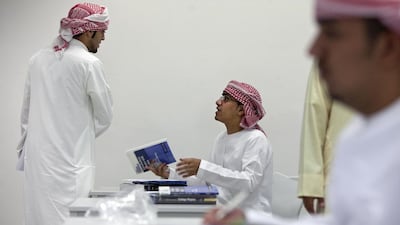ABU DHABI // Students and parents in the capital believe that more must be done to ensure young people can enter the world of work with the proper qualifications.
Reacting to news that Adec is to introduce new controls to ensure courses offered in Abu Dhabi provide good employment prospects, they said that the range and quality of subjects on offer must improve.
Sara Saeed, 33, recently completed her masters in tourism and cultural communication at a government university.
“I really was not interested, but there was nothing else. This was the closest thing I could get that was related to my field. I did enjoy it in the end but now I am looking for online programmes in journalism.”
Another student said that courses on offer did not cover a wide enough variety of subjects.
“We want new majors. I am tired of having only business, communication and education as an option,” said B Mohamed, 22. “I have always been interested in marine biology but my parents said I can only go to Zayed University,” she said. Ms Mohamed is studying communications.
One parent is hopeful that the new regulations will mean that Emiratis will no longer have to go abroad for higher education.
“At last,” Ahmed Abdulla said. “I wish this had happened four years ago instead of me having to travel abroad for my master’s due to insufficient master’s programmes. This will ensure that our kids have a variety of undergraduate and postgraduate degrees in the UAE.”
Mr Abdulla studied criminal justice in the United States.
A parent, Umm Hamed, said: “My son just finished his education and has applied for a scholarship. It breaks my heart to see him go, especially since he is all I have. If this major was available in Abu Dhabi he wouldn’t have to leave us.”
Her son is travelling to study nuclear physics in the UK.
Emirati Abeer S said more programmes would help the social structure and population.
“We have an entire generation who married expats because there were no majors in the UAE and they had to travel abroad and spend years there.”
She married an Egyptian she met while studying medicine in Egypt. “I know the country is always encouraging Emiratis to marry from the same nationality. If there is no need for them to go abroad to study then I am sure there will be less Emiratis who choose to marry an expat.”
Shamsa Al Ali, however, thinks the move is useless.
“Employers prefer if you are educated abroad. It doesn’t matter what major, but as long as you graduated from a local university then you are not considered one of the top. Priority is always given to graduates of US universities, then Europe.”
Abu Dhabi resident Mariam Ahmed said: “I studied general medicine at a university in Dubai for four years and when I wanted to specialise they refused because the university I was studying in was not accredited. I applied everywhere and nowhere accepted my degree. I wasted four years of my life.”
It is not just introducing new programmes, she said, “these programs have to be accredited”.
salnuwais@thenational.ae

